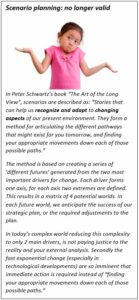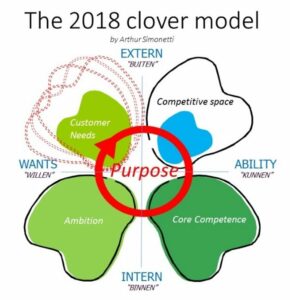
Are we losing long-term perspective in strategy development?
Door Arthur Simonetti*
Do we still need a long-term vision if our strategic planning cycles are shortening from 5 to 3 years and from 3 to 1 year? How do we make long-term strategic decisions? Or are we moving to tactical decisions only?
Maybe you have also noticed in your own company that creating long-term strategic plans has lost its momentum and importance. Our focus has shifted to shorter time horizons and our management attention has shifted to “how to act faster”, “how to act agilely”, because of all the exponential changes around us. Are we adrift, all at sea, or are we still charting our own course? Strategic plans and planning are no longer our main guides, we must rely on and trust our core beliefs and core strengths, even more than ever before.
Purpose and core competencies drive our strategic decisions, this combination is our compass and our lighthouse.
We still make strategic (long-term) decisions, however without long-term forward-looking strategic plans, these decisions are driven by the “purpose” of the company.
As our short-term strategic decisions are increasingly forced upon us, they require a strong reliance on our core competencies, to ensure we chart our own course rather than let ourselves by swayed by external factors.
Therefore, I am convinced that “purpose-driven” companies are better and faster at making strategic decisions and will outperform their peers. Companies that know their core competencies will be more successful adopting the new exponential developments. In order for the fittest to survive, they must have a well-understood purpose and core competencies.
The devaluation of a long-term strategic plan
Let me be clear, strategy is, for me, not equal to a plan. Strategy is what you do, it is represented by all your actions. In principle, your strategic plan (whether it is articulated or not) is reflected in your actions. “Show me your actions and I will tell you your plan”.
 The value of a plan has always been twofold. The first is the “making of”; this helps to get buy-in and alignment on the full picture on the world we are operating in. Secondly, the strategic option chosen serves as a compass for decision-making. But what if the environment changes too rapidly; if new technologies are no longer following Moore’s law but are truly growing exponentially? In this VUCA (Volatile, Uncertain, Complex, and Ambiguous) world a sound external analysis is impossible. Even scenario planning is no longer valid (see box) as there are too many drivers for change.
The value of a plan has always been twofold. The first is the “making of”; this helps to get buy-in and alignment on the full picture on the world we are operating in. Secondly, the strategic option chosen serves as a compass for decision-making. But what if the environment changes too rapidly; if new technologies are no longer following Moore’s law but are truly growing exponentially? In this VUCA (Volatile, Uncertain, Complex, and Ambiguous) world a sound external analysis is impossible. Even scenario planning is no longer valid (see box) as there are too many drivers for change.
Purpose: THE distinctive driver of your company
Purpose is the new buzzword in marketing. As with all meaningful concepts it is easily jargonized and abused. I first became aware of the concept of purpose through our marketing guru Philip Kotler, who described this concept in Marketing 3.0. Kotler states: “Marketing is about clearly defining your unique identity and strengthening it with authentic integrity to build a strong image”. “Marketing should no longer be considered as only selling and using tools to generate demand. Marketing should now be considered as the major hope of a company to restore consumer trust”. This is, for me, equivalent to the purpose of a company.
As there is no good definition of purpose marketing, we have developed one together with my friend Ruud Boer for his next edition of the Dutch Brand design book:
“Purpose marketing is connecting your authentic drive to contribute to a better world with the needs of the customers and stakeholders, in order to fulfill your responsibility to society. This drive is embedded and founded in the culture of a company. It not only results in a profitable company but attracts motivated and inspired employees and satisfied and loyal customers, and above all it drives a better world.”
Purpose is not a campaign, purpose is your DNA. Knowing your purpose is like sequencing your DNA. It is THE distinctive driver of your company. As it is so strongly ingrained in your company, you could even argue it is engraved in individual employees’ brains. Therefore, it will influence your subconscious decision-making, your system 1 (as described by Kahneman). When planning and predicting become more complex, and drivers for change more unpredictable, wouldn’t it be a relief if we could fall back on our intuition, on our bigger purpose, to drive our strategic decisions? This could be the autonomous substitution for long-term planning.
There is no need for a long-term plan, as long as you are purpose driven, to steer system 1 decision-making.

The 2018 Clover model
For strategic plans and decisions, I have always used the Clover model (which I designed in the 90s, and explained in an earlier blog). It highlights the 4 most important questions you should ask yourself when building a strategy. It doesn’t matter where you start but the answers to all quadrants should form a coherent story. 2 dimensions define them, the internal-external dimension and the Want and Ability dimension. The questions are:

- INTERNAL WANT: what is your ambition? What do you want to achieve?
- EXTERNAL WANT: what does the customer need? What does the market want?
- EXTERNAL ABILITY: what is possible in the market, given the competition?
- INTERNAL ABILITY: which competencies do you have which will fulfill your ambition and the market need?
But this model is highly affected by all external developments. The blue ocean space is getting smaller as startups and disruptors cleverly make use of the exponentially growing new technologies and thereby change the whole ecosystem. Customer needs are changing as well. New solutions driven by technology (like AI and the Internet of Things) address underlying needs in new ways, as well as opening new needs. These rapid developments are unforeseeable, and force companies to react agilely and plan with shorter time spans.
Back to the core competencies: to feed system 2 decision making!
But what about these shorter time spans? When planning horizons are moving to 1 year or maybe even shorter, how do we maneuver in this world? I am strong believer in the Clover model for guidance in creating coherent decision-making, but increasingly I am convinced that to satisfy our system 2, we need a more logical compass; a stable fundament that will allow us to experiment with the unpredictable. The answer for me is our core competencies.
Also, with core competencies being an older buzzword in marketing, it has been jargonized and abused. I still remember the power of the concept if applied properly. The essence for me was, and is, that it is a unique combination of capabilities that is not easily copied by competitors. It is not ONE capability or ONE competence. It is the unique way your company can process, deliver, create, adopt, or achieve something that is the core of your value proposition to your customers. Or better phrased on Wikipedia: “It can be defined as “a harmonized combination of multiple resources and skills that distinguish a firm in the marketplace” and therefore are the foundation of companies’ competitiveness.”
Make Prahalad and Hamel heroes again!
Therefore, I plead for a revitalization of core competencies thinking and awareness. This should be our anchor and starting point in capturing new strategic opportunities. It should be our rudder in short-term decision-making, and our asset in collaborating with others to fulfill new customer demands.
The synergy of articulated core competencies and a purpose-driven ambition will keep us ahead of the curve.
When planning becomes too cumbersome because the external world is changing too rapidly, we should rely on our company intuition and proven strength. Our collective purpose, anchored in our DNA will steer our subconscious decision-making and satisfy our system 1 thinking. Our conscious decision making (system 2) will be satisfied with clear arguments and proven strengths, our core competencies. It is this combination, purpose and core competencies, that will drive success in a VUCA world.
* Arthur Simonetti is Marketing Director bij DSM en voorzitter van de NIMA B2B Marketing Community







